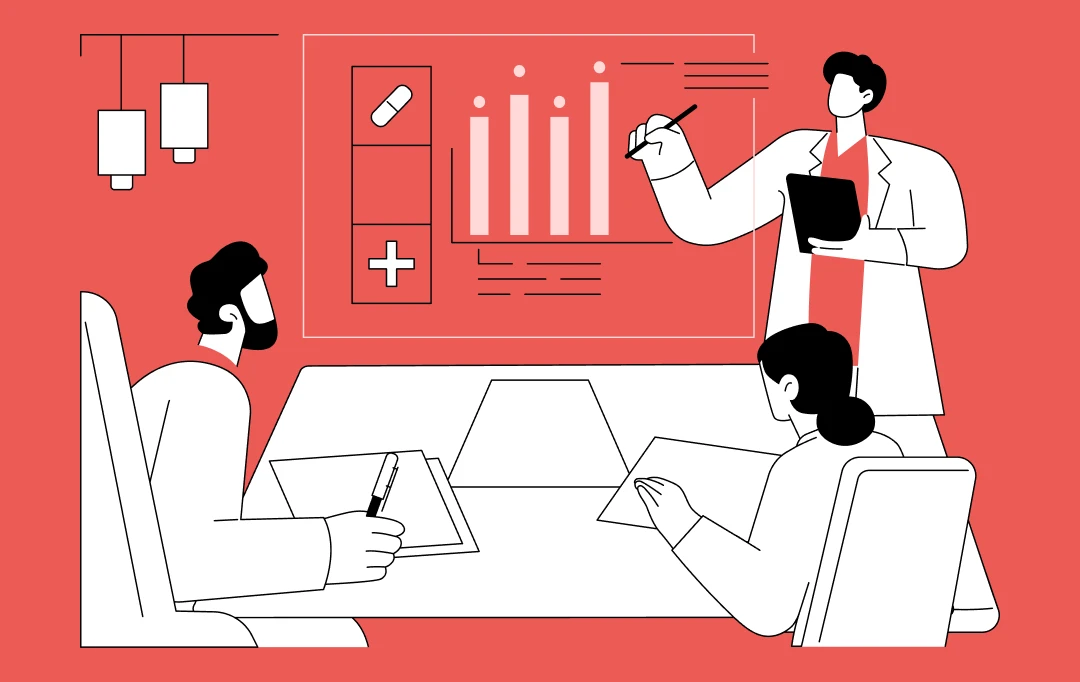- What is Supply Chain in the Healthcare Industry?
- What is Supply Chain Management for Healthcare?
- Role of Supply Management in Healthcare
- How Crucial is Technology in the Healthcare Supply Chain?
- How can Emerging Technologies Transform Healthcare Supply Chain Solutions?
- Increasing visibility using blockchain
- Predictive analysis and AI
- IoT and RFID tracking
- Robotic Process Automation (RPA)
- Drone technology
- Healthcare Supply Chain Automation
- Digital Healthcare Provides An Edge
- Why are Digital Supply Chains Gaining Such Importance?
- Some digital supply chain examples
- Steps to Successfully Integrate Technology into Healthcare Supply Chains
- Alignment
- Assessment
- Analysis
- Planning
- How can Appinventiv Help in Leveraging Technology in Healthcare Supply Chains?
- Conclusion
- FAQs
Top executives at medical facilities are considering possibilities to restructure their supply chain management for healthcare to be more efficient in operations and cost-effective. They want to do so while improving patient care as hospitals and health systems gradually adjust to life after the pandemic.
The ability to save patient lives depends on an effective healthcare supply chain. Additionally, adopting technology is a big step in the direction of increasing that efficiency.
That said, it is not surprising to see that hospitals are utilizing technology more than ever, from patient portals to electronic health records (EHRs). However, it may come as a surprise that hospitals haven’t adopted technology to its fullest in one field: inventory management, often known as supply chain management (SCM).
So it makes sense that supply chain expenses frequently rank among the highest for hospitals and healthcare systems. According to research by Navigant Consulting, hospitals may save an average of 17.7%, or $11 million per hospital, annually by automating and standardizing their supply chain procedures with the use of technology.
Healthcare firms gain long-lasting benefits from the conversion of a traditional supply chain to a digital supply chain. Everyone now has access to quicker, safer, more convenient, and more affordable healthcare in the form of digital healthcare. In addition, hospital systems can save operating costs and identify growth prospects thanks to the digitization of the healthcare supply chain.
In this article, we will discuss the various aspects of a healthcare supply chain and explain the importance of adopting technology to make traditional healthcare supply chains even more efficient.
We will see how technology can aid in supply chain development and take a look at the steps to integrate it successfully. Let’s begin.
What is Supply Chain in the Healthcare Industry?
The production, distribution, and delivery of medications and other healthcare supplies to patients are ensured by a complex network of systems, elements, and procedures known as the supply chain in the healthcare industry.
Even during pandemics or natural disasters, this intricate worldwide system has been set up with plenty of built-in safeguards to guarantee that medicines and other medical supplies are produced and distributed promptly.
The ability of the supply chain to anticipate, plan for, and respond to probable interruptions in one or more chain links over a varied pre-established global network is the most important of these defenses.
Pharmaceutical quality standard developers, hospitals, health systems, pharmacies, and health insurance providers are a few of the numerous participants in the healthcare supply chain. However, manufacturers and distributors are crucial to the healthcare supply chain.

We rely on manufacturers to produce the medications and medical supplies that form the initial link in the supply chain in hospitals. Manufacturers control their product flow from the site of manufacturing to wholesalers and, in some cases, directly to a pharmacy or hospital. The second link in the supply chain for healthcare is the distributor.

When it comes to medical supply distribution, distributors buy prescription medicines and other healthcare supplies in huge quantities from manufacturers and carefully manage substantial inventories in key sites across the region. Some wholesalers specialize in serving particular clientele, such as nursing homes, or a particular product category, such as biologics.
What is Supply Chain Management for Healthcare?
Supply chain management for healthcare is the practice of buying and distributing medical goods and services as they are transported from the loading port to the patient.
According to James Spann, Practice Leader of Supply Chain & Logistics at Simpler Healthcare,
“Supply chain is simply the management of upstream and downstream connections between suppliers and customers to offer higher customer value at less cost to the supply chain as a whole.”
The management of the healthcare supply chain is quite difficult. The difficulties are only exacerbated by inadequate data reporting, subpar product uniformity, growing regulatory requirements, and a general lack of automation.
While there are many difficulties in supply chain management, the main problems are hoarding of goods, desire for particular products that are in stock, product expirations, out-of-stock problems that may result in high delivery costs, theft, and an unjustified increase in inventory costs based on demand. These and other problems are a factor in supply costs that exceed the budget.
Role of Supply Management in Healthcare
The purpose of supply chain management in healthcare industry is to identify departmental vulnerabilities and suggest solutions to mitigate them. It tries to pinpoint problematic areas to attain desired health outcomes and boosts financial support for international health.
The benefits of a good supply chain in the healthcare industry include enhanced operations, efficient resource usage, content staff, successful treatment, and contented patients.
Supply management in healthcare enables proper integration of hospital departments, operations, and revenue cycle. The supply chain can be thought of as a backend application that is essential for integrating all the various activities.
Supply chain management in hospitals ensures that medications and other products are available when they are needed, reduces inventory waste, improves patient care, and coordinates efforts across all departments to reduce human and pharmaceutical errors.
This can be done by taking various actions, such as integrating digital subsystems, optimizing processes, and incorporating technologies to promote supply chain digitalization.
How Crucial is Technology in the Healthcare Supply Chain?
The incorporation of cutting-edge, disruptive technologies into supply chain management systems, such as data analytics, AI in healthcare, IoT, and Blockchain, promotes efficient operations, enhanced security, and rapid growth in the global healthcare sector.
Markets & Markets predicts that the worldwide supply chain management market in healthcare will grow from $2.2 billion in 2020 to $3.3 billion by 2025. The development of cloud-based solutions, decreased operating expenses, increased efficiency, and general profitability are key drivers fostering this expansion. The widespread use of SCM, particularly in the healthcare sector, is proving to be incredibly advantageous for people’s lives which is boosting the growth of the healthcare supply chain management market.
How can Emerging Technologies Transform Healthcare Supply Chain Solutions?

The results could be fatal or drastically alter a patient’s life if practitioners run into unexpected shortages while providing care. Fortunately, technological advancements can lead to a stronger supply chain in hospitals that is more resilient to shocks. Following are the ways in which some of the most cutting-edge modern technologies can propel us towards a more efficient digital healthcare with robust medical supply distribution.
Increasing visibility using blockchain
Blockchain and cryptocurrencies are frequently used interchangeably. Although this digital ledger technology began there, its promise extends well beyond that. For instance, the blockchain might make it easier to share knowledge about medical supplies and other vital items that sustain healthcare institutions.
The circular economy seeks to reduce waste and repurpose resources to meet changing requirements. A recent paper explores how the blockchain could support this approach. For instance, the authors mentioned how, after the COVID-19 outbreak began, distilleries switched to making hand sanitizer, and those with spare fabric utilized it to make face masks for essential personnel.
The most effective new methods for tracking the whole lifecycle of a medicine, down to a single dose, are those based on blockchain technology. To provide a way to track items securely and dependably throughout their entire lifecycle, organizations are already developing a range of innovative blockchain-based solutions.
By decreasing fraud and enabling better-managed quality in the production and distribution of pharmaceuticals, blockchain plays a critical role in supply chain transformation. Pharmaceutical corporations like Pfizer and Roche are already actively developing such solutions.
Predictive analysis and AI
The way that data is managed, analyzed, and used across all industries has undergone a fundamental transformation, thanks to AI. Organizations now use predictive analytics instead of the more fundamental descriptive kind because of the strides in AI. Monitoring patterns and estimating the possibility of future events are made easier with the use of predictive analytics.
Healthcare firms can use predictive analysis to take advantage of statistical data and manage the supply chain in hospitals and elsewhere by reducing variance while also learning more about demand trends and supply utilization. Accurate forecasting supported by data facilitates the optimization of inventories and aids in better-informed decision-making.
IoT and RFID tracking
The workforce may lose hours of production over a simple activity like finding an asset. The use of IoT-capable devices equipped with hospital supply chain software with RFID(Radio-frequency Identification) tracking systems may prove to be both cost and time-efficient.
The assets can be located, tracked, and monitored using a real-time location system (RLTS). In addition to streamlining the healthcare supply chain, automated inventory tracking also gives full system awareness.
Robotic Process Automation (RPA)
The labor-intensive, repetitive, and manual processes in a healthcare supply chain are eliminated by the adoption of an RPA system. Usually, it cuts down on the time and money spent on a supply chain and gets rid of the chance that human error will be a problem down the line.
Routine automated tasks improve productivity and lower costs. Modernizing a warehouse with RPA-deployed devices optimizes revenue and boosts productivity.
Drone technology
When it comes to quickly and efficiently delivering medications, vaccines, medical kits, and other supplies, drone technology can provide organizations an advantage. Drones can help with challenging deliveries by serving as adaptable courier equipment.
When necessary, it can also be used to deliver blood or blood samples to the desired recipient at the specified location. Additionally, compact indoor drones can be put in hospital buildings to be used to carry medications to patients right at their bedsides.
Healthcare Supply Chain Automation
With the straightforward objective of improving the supply chain process, supply chain software streamlines and automates routine manual processes carried out within healthcare firms.
Among the many advantages of software automation is its ability to streamline inventory, reduce waste, enable quick, data-based decisions, and reduce labor, supply, and operational costs. For these reasons, it is becoming increasingly crucial to enlist the help of supply chain software development firms like Appinventiv.
Typically, there are two categories of SCM technology solutions available to decision-makers in medical supply inventory management.
Enterprise resource planning (ERP) systems are the first option, but they are not necessarily the ideal option for hospitals because they are used in many different industries, and the vendors frequently lack considerable healthcare knowledge.
Since ERP systems are often adopted by bigger, non-healthcare-related firms, they may take longer to build and require specialized customization resources, resulting in a system that is essentially rigid and that healthcare professionals must adapt to rather than having it adapt to their workflows.
The second type, referred to as specialty healthcare inventory and supply chain solutions, frequently have lower prices and incorporates more in-depth industry knowledge, resulting in adaptable, healthcare-focused solutions. These kinds of systems frequently concentrate on particular fields, such as surgery, interventional medicine, and other healthcare divisions.
Digital Healthcare Provides An Edge
Delivering the ideal product to the appropriate patient at the right time is made possible by the supply chain digitalization in a cost-effective way for healthcare providers.
By creating a digital supply chain, healthcare providers will be better positioned to take advantage of technological advancements made to enhance data flow, analytics, provider-patient connectivity, asset monitoring, and regulatory compliance. Digital healthcare is the way of the future.

Why are Digital Supply Chains Gaining Such Importance?
The following issues that healthcare organizations confront are pushing them to think about creating digital supply chains:
Cost reduction
The healthcare industry’s shift from an emphasis on volume to value is forcing providers to look for new ways to manage resources and lower overall costs. These changes to payment models are the result of healthcare reform, as well as rising prices and narrowing margins.
Improving patient engagement, care, and delivery
Hospitals may save money by having a productive digital supply chain, and by repurposing staff time for patient care, cutting down on wait times, and fewer canceled appointments, they can improve patient engagement and satisfaction.
Cutting out irrational variation
By automating routine procedures, hospitals may free up staff time for higher-value tasks while lowering the likelihood of bad results brought on by error and variability.
Some digital supply chain examples
Utilizing data to organize and monitor flu medication
Utilizing real-time data to predict seasonal demand for anti-influenza medications gives the hospital a clearer view of where the drug doses are located in the supply chain. It confirms that the proper supplies are accessible for the right patient at the right time and enables the hospital to shift supplies to areas of most need during a shortage.
Increasing inventory transparency
Healthcare providers and suppliers can enhance visibility over consignment inventory at the patient’s bedside and alter the movement of inventories in real-time to locations experiencing shortages by implementing cutting-edge technologies like radio frequency identification (RFID) and supply chain digitalization at the point of use.
Tracking resources with blockchain throughout the care spectrum
The immutability of blockchain paves the way for product traceability from suppliers of raw materials to manufacturers to healthcare providers to consumers, and it may help with inquiries into how opioids end up in the wrong hands.
Supply chain digitalization and digital healthcare will be the biggest trends in the healthcare industry in the years to come.
Steps to Successfully Integrate Technology into Healthcare Supply Chains
The following four steps are vital to successfully infuse the right technologies in the supply chain management for healthcare:
Alignment
It’s essential to first bring your business and stakeholders together by defining a vision of success geared at the long-term value, given the variety of elements and moving parts in the process.
This transition will frequently necessitate major adjustments to procedures and job descriptions. For the digital supply chain transformation to be effective, it is essential to make sure that everyone is on the same page about the overarching strategy, plan, and objective.
Assessment
While the majority of hospitals and health systems have a high-level understanding of where their supply chain operations stand, a full evaluation entails a thorough investigation of the processes, people, and technology.
This should be done with a special focus on transformation and optimization in line with the end goal in mind. It is possible to develop more precise strategies, make adjustments more quickly, and implement them more quickly thanks to a thorough grasp of supply chain staffing and the current operating structure.
Analysis
After you’ve aligned and thoroughly examined every aspect of the digital supply chain, the solutions you find assist in building a thorough value proposition that simulates a scalable and sustainable future of healthcare supply chain.
To find potential for improvement in each process, people, and technology area, analyze the data already available, and map the supply chain operations. As a result, you may develop a data-driven business case for the future that will serve as a roadmap for concrete adjustments and advancements.
Planning
Create an all-encompassing healthcare supply chain strategy that relates crucial organizational objectives to both short- and long-term operational initiatives to bring the value proposition to life. By analyzing processes and data, it is possible to identify short-term investments and create a long-term transformation road map.
How can Appinventiv Help in Leveraging Technology in Healthcare Supply Chains?
Appinventiv is a rapidly growing IT consulting organization, taking pride in the effective implementation of projects using cutting-edge technology. We offer innovative services such as supply chain software development that goes above and beyond what is expected by our customers.
We are a fast-growing software development firm that offers software development for businesses of all sizes and across all industry verticals. We have a solid clientele base and almost ten years of experience. Our offerings also include top-notch healthcare software development services.
For instance, Appinventiv collaborated with Health-e-People to develop a highly functioning mobile app solution that unifies all of a user’s medical data on a single mobile platform. We made sure that each challenging task was divided into manageable chunks to facilitate user interaction with the program. The result that was delivered was an app that supported every action we wanted it to take and benefited everyone—users, caregivers, and researchers.
If you are keen on implementing supply chain digitalization, we can ace healthcare supply chain management software development for you. Get in touch with our professionals now.
Conclusion
The correct infusion of technologies such as AI, Blockchain, automation, data analytics, IoT and RFID, etc., can drastically improve supply chain management for healthcare. All you need to do is follow the four steps mentioned above to understand what will work best for your needs.
FAQs
Q. How does technology affect the supply chain?
A. Organizational flexibility, business process automation, and supply chain management innovation are all accelerated by the use of technology in supply chains.
Q. How can the healthcare supply chain be improved?
A. The Healthcare supply chain can be improved by infusing the latest technologies such as AI, Blockchain, data analytics, etc., to supply chain management in hospitals.
Q. What is supply chain management in healthcare?
A. Supply chain management for healthcare is the practice of buying and distributing medical goods and services as they are transported from the loading port to the patient.
Q. What role does technology play in healthcare?
A. Modern disruptive technologies that are being integrated into healthcare encourage effective operations, improved security, and quick expansion of the global healthcare industry.
Q. What role does technology play when it comes to supply chain management in the healthcare industry?
A. Hospital supply chains may become more robust and shock-resistant as a result of technological improvements.
Q. What are the functions of the healthcare supply chain?
A. It makes it easier to monitor and regulate the flow of pharmaceuticals, medical equipment, and healthcare services from the producer to the consumer, as well as to make sure that patients and healthcare professionals receive the prescription drugs and treatments they require when and when they need them.



Why Telehealth Security is Non-Negotiable for Patient Trust and How to Achieve It
Key takeaways: Telehealth security is crucial for patient trust and the continued adoption of digital healthcare services. The rising tide of cyber threats, from ransomware to inadequate authentication, poses significant risks to patient data and provider reputation. Implementing robust security measures like end-to-end encryption, multi-factor authentication, and regular audits is non-negotiable. Compliance with regulations like…

10 Ways Healthcare Providers Are Using Patient Analytics to Enhance Care Plans and Optimize Outcomes
Imagine a world where doctors don’t just react to health crises, but predict and prevent them before they happen. This is the reality with patient analytics for healthcare providers. The healthcare industry is no longer limited to treating symptoms—it’s now about understanding patterns, making smarter decisions, and delivering care that’s truly personalized. And it’s not…

Exploring the Role of Personalization in Healthcare through Technology
Key takeaways: Personalization in healthcare transforms patient care from generic, population-based treatments to individualized approaches tailored to each patient's unique needs. Advanced technologies like AI, IoMT, and genomics are the core enablers for tailoring medical treatments. Personalization drives significant benefits, including improved patient outcomes, higher engagement, and reduced costs. The future of healthcare is hyper-individualized,…


















